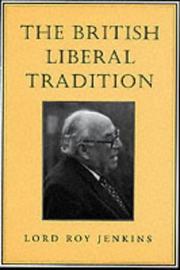| Listing 1 - 10 of 34 | << page >> |
Sort by
|
Book
ISBN: 0203498240 1135776601 0714650471 9780714650470 9780203498248 Year: 2008 Publisher: New York ; London : Routledge,
Abstract | Keywords | Export | Availability | Bookmark
 Loading...
Loading...Choose an application
- Reference Manager
- EndNote
- RefWorks (Direct export to RefWorks)
Reginald McKenna has never been the subject of scholarly attention. This was partly due to his own preference for appearing at the periphery of events even when ostensibly at the centre, and the absence of a significant collection of private papers. This new book redresses the neglect of this major statesmen and financier partly through the natural advance of historical research, and partly by the discoveries of missing archival material. McKenna's role is now illuminated by his own reflections, and by the correspondence of friends and colleagues, including Asquith, Churchill, Keynes, Baldwin, Bonar Law, MacDonald, and Chamberlain. McKenna's presence at the hub of political life in the first half of the century is now clear: in the radical Liberal governments of 1905–16, where he acted as a lightning conductor for the party; during the war, where he served as the Prime Minister's deputy and the principal voice for restraint in the conduct of the war; and as chairman of the world's largest bank, where until his death in office aged eighty, he prompted progressive policies to deal with the issues of war debt, trade, mass unemployment, and the return to gold.
Politicians --- McKenna, Reginald, --- Liberal Party --- Great Britain --- Politics and government --- Liberal Party (Great Britain) --- Liberal Party (Gt. Brit.) --- Whig Party (Great Britain) --- Social and Liberal Democrats (Great Britain) --- north --- monmouthshire --- smith --- square --- sir --- charles --- dilke --- admiralty --- house --- bonar

ISBN: 1134225237 1280480815 9786610480814 0203018745 9780203018743 0415366151 041536616X 9780415366151 9780415366168 9781134225231 9781280480812 6610480818 9781134225187 9781134225224 0559885008 9780559885006 Year: 2006 Publisher: London New York Routledge
Abstract | Keywords | Export | Availability | Bookmark
 Loading...
Loading...Choose an application
- Reference Manager
- EndNote
- RefWorks (Direct export to RefWorks)
Sir Robert Peel provides an accessible and concise introduction to the life and career of one of the most political leaders of the nineteenth century. Perhaps best known for seeing through the Repeal of the Corn Laws, Peel had an enormous impact on political life of his age and beyond. Eric J. Evans reassesses Peel's career, arguing that although Peel's executive and administrative strengths were great, his arrogance, lack of empathy with the development of political parties and his inflexible commitment to economic liberalism presented political problems which he was incapable of
Prime ministers --- Peel, Robert, --- Conservative Party (Great Britain) --- Tory Party (Great Britain) --- Scottish Unionist Party --- Liberal Unionist Party (Great Britain) --- Conservative and Unionist Party (Great Britain) --- Conservative Party (Gt. Brit.) --- History --- Great Britain --- Politics and government

ISBN: 1281996092 9786611996093 1442680571 9781442680579 0802084540 9780802084545 Year: 2001 Publisher: Toronto
Abstract | Keywords | Export | Availability | Bookmark
 Loading...
Loading...Choose an application
- Reference Manager
- EndNote
- RefWorks (Direct export to RefWorks)
"In this wide ranging lecture, Lord Roy Jenkins tells the story of the rise and fall of the British Liberal Party under prime ministers Gladstone, Churchill, Asquith, and Lloyd George, and explores the place of current British prime minister Tony Blair in this tradition. Beginning his address with the Liberal Party's birth in London in 1859, Lord Jenkins discusses the relative success of these prime ministers in dealing with social issues, such as religion and suffrage, and aspects of government legislation including education, foreign policy, and the military. He punctuates this analysis with his views on the personalities of these men, recognizing that the character of leaders naturally shapes their leadership. Of William Ewart Gladstone, for example, Lord Jenkins notes that, while he was 'not necessarily the greatest prime minister, ' Gladstone was 'certainly the most remarkable specimen of humanity ever to inhabit 10 Downing Street.'"--Jacket.
Liberalism --- Liberal egalitarianism --- Liberty --- Political science --- Social sciences --- History. --- Liberal Party (Great Britain) --- Liberal Party (Gt. Brit.) --- Whig Party (Great Britain) --- Social and Liberal Democrats (Great Britain) --- Great Britain --- Politics and government
Book
ISBN: 0826489745 1501300733 1441147616 9781441147615 9781441123695 9780826489746 9781501300738 1441161112 Year: 2010 Publisher: New York : Continuum,
Abstract | Keywords | Export | Availability | Bookmark
 Loading...
Loading...Choose an application
- Reference Manager
- EndNote
- RefWorks (Direct export to RefWorks)
"This book reveals the true nature of Conservative Party politics by examining the centrality of the myth of One Nation. The use of the term One Nation clearly matters for Conservative Party politics not just in its 'ancestral' use emanating from Disraeli's 1840s novels and his late nineteenth century rhetoric but also through Baldwin's speeches and to the failure of John Major to replicate such a serene and contented image of the Nation in the 1990s. But, as a concept for the Conservatives, it means so much more than mere imagery. It has been successfully utilized in their 'palaeontological' approach to their history in order to give the impression that only the Party puts 'Nation' before any sectional interest, that only the Conservative Party, as the national Party, has the ability to assuage and balance the plurality of competing interests on behalf of the Nation. It is because of this long and successful utilization of the term 'One Nation' that so many within the Party are so keen to lay claim to it."--Bloomsbury Publishing.
Book
ISBN: 1781706107 9781781706107 152613022X 9781526130228 Year: 2012 Publisher: Manchester Manchester University Press
Abstract | Keywords | Export | Availability | Bookmark
 Loading...
Loading...Choose an application
- Reference Manager
- EndNote
- RefWorks (Direct export to RefWorks)
Why did it take the Conservative Party so long to recover power? After a landslide defeat in 1997, why was it so slow to adapt reposition itself and rebuild its support? This title addresses these questions through a contextualised assessment of Conservative Party politics between 1997 and 2010.
Book
ISBN: 110719072X 1281982709 9786611982706 0511464541 0511575254 0511462972 0511465289 0511462212 0511463766 9780511465284 9780511464546 052151603X 9780521516037 9780511575259 Year: 2008 Publisher: Cambridge New York Cambridge University Press
Abstract | Keywords | Export | Availability | Bookmark
 Loading...
Loading...Choose an application
- Reference Manager
- EndNote
- RefWorks (Direct export to RefWorks)
This in-depth commentary on the Charities Act 2006 outlines the new requirements for qualifying as a charity and examines the concept of 'public benefit'. The author, a former Charity Commission lawyer who has practised in charity law for 20 years, conducts a theoretical and empirical analysis of the reasons why charitable status might be removed by the Charity Commission, looks at the position of charitable property when institutions cease to be charitable and examines the likely effect of the independent Charity Tribunal on the appeals process. The post-Act treatment of controversial charities is also explored.
Charitable uses, trusts, and foundations --- Status (Law) --- Civil status --- Persons (Law) --- Great Britain. --- Gt. Brit. --- Charity Commission (Great Britain) --- Charity Commissioners for England and Wales --- Law --- General and Others
Book
ISBN: 0191611514 1283639440 Year: 2012 Publisher: Oxford : Oxford University Press,
Abstract | Keywords | Export | Availability | Bookmark
 Loading...
Loading...Choose an application
- Reference Manager
- EndNote
- RefWorks (Direct export to RefWorks)
This text is about how and why parties in general, and the Conservative Party in particular, make changes to the face they present to the electorate, the way they organise themselves, and the policies they come up with. It is an in-depth but comprehensive study based on original archival sources.
Policy sciences --- History. --- Conservative Party (Great Britain) --- Great Britain --- Politics and government. --- Policy-making --- Policymaking --- Public policy management --- Conservative and Unionist Party (Great Britain) --- Conservative Party (Gt. Brit.) --- Tory Party (Great Britain) --- Scottish Unionist Party --- Liberal Unionist Party (Great Britain) --- England --- Politics and government
Book
ISBN: 9780198723509 0198723504 132221963X 0191035262 0191790281 9780191035265 9780191790287 Year: 2015 Publisher: Oxford
Abstract | Keywords | Export | Availability | Bookmark
 Loading...
Loading...Choose an application
- Reference Manager
- EndNote
- RefWorks (Direct export to RefWorks)
This title explores the reception, generation, and use of economic ideas in the British Liberal Party in the early twentieth century, analysing the intellectual influences which shaped their economic thought and highlighting how the party sought to reconcile its progressive identity with its longstanding commitment to free trade and competitive markets.
Liberal Party (Great Britain) --- Liberal Party (Great Britain) / History / 20th century. --- Liberale Partei (Grossbritannien) --- History --- 1900 - 1999 --- Great Britain --- Grande-Bretagne --- Politics and government --- Economic policy --- Politique et gouvernement --- Politique économique --- History. --- Liberal Party (Gt. Brit.) --- Whig Party (Great Britain) --- Social and Liberal Democrats (Great Britain) --- Economic conditions
Book
ISBN: 1780930399 1780930402 1780931166 1472545133 178093114X Year: 2014 Publisher: London ; New York : Bloomsbury Academic,
Abstract | Keywords | Export | Availability | Bookmark
 Loading...
Loading...Choose an application
- Reference Manager
- EndNote
- RefWorks (Direct export to RefWorks)
"This book offers a comprehensive and accessible study of the electoral strategies, governing approaches and ideological thought of the British Conservative Party from Winston Churchill to David Cameron. Timothy Heppell integrates a chronological narrative with theoretical evaluation, examining the interplay between the ideology of Conservatism and the political practice of the Conservative Party both in government and in opposition. He considers the ethos of the Party within the context of statecraft theory, looking at the art of winning elections and of governing competently. The book opens with an examination of the triumph and subsequent degeneration of one-nation Conservatism in the 1945 to 1965 period, and closes with an analysis of the party's re-entry into government as a coalition with the Liberal Democrats in 2010, and of the developing ideology and approach of the Cameron-led Tory party in government."--Bloomsbury Publishing.
Conservatism --- Political parties --- History. --- Conservative Party (Great Britain) --- Great Britain --- Politics and government. --- Conservativism --- Neo-conservatism --- New Right --- Right (Political science) --- Political science --- Sociology --- Conservative and Unionist Party (Great Britain) --- Conservative Party (Gt. Brit.) --- Tory Party (Great Britain) --- Scottish Unionist Party --- Liberal Unionist Party (Great Britain) --- England --- Politics and government

ISBN: 1280524537 1423737121 0195362780 1601297599 9781423737124 9780195062380 0195062388 9781280524530 0195062388 9780195362787 9781601297594 0197713114 Year: 1990 Publisher: New York Oxford University Press
Abstract | Keywords | Export | Availability | Bookmark
 Loading...
Loading...Choose an application
- Reference Manager
- EndNote
- RefWorks (Direct export to RefWorks)
This text explores how various pressure groups, such as the British Navy League, Tariff Reform League and the Anti-Socialism Union, forced the Conservative Party to adapt during the Edwardian period.
Nationalism --- Conservatism --- Conservativism --- Neo-conservatism --- New Right --- Right (Political science) --- Political science --- Sociology --- Consciousness, National --- Identity, National --- National consciousness --- National identity --- International relations --- Patriotism --- Autonomy and independence movements --- Internationalism --- Political messianism --- History --- Conservative Party (Great Britain) --- Tory Party (Great Britain) --- Scottish Unionist Party --- Liberal Unionist Party (Great Britain) --- Conservative and Unionist Party (Great Britain) --- Conservative Party (Gt. Brit.) --- History. --- Great Britain --- Politics and government
| Listing 1 - 10 of 34 | << page >> |
Sort by
|

 Search
Search Feedback
Feedback About UniCat
About UniCat  Help
Help News
News